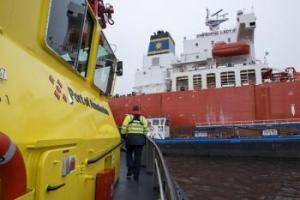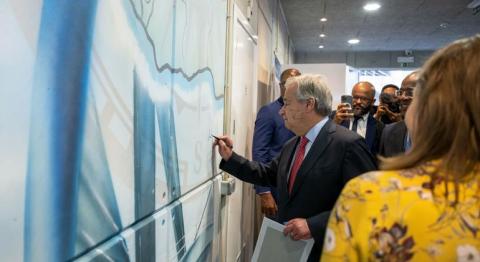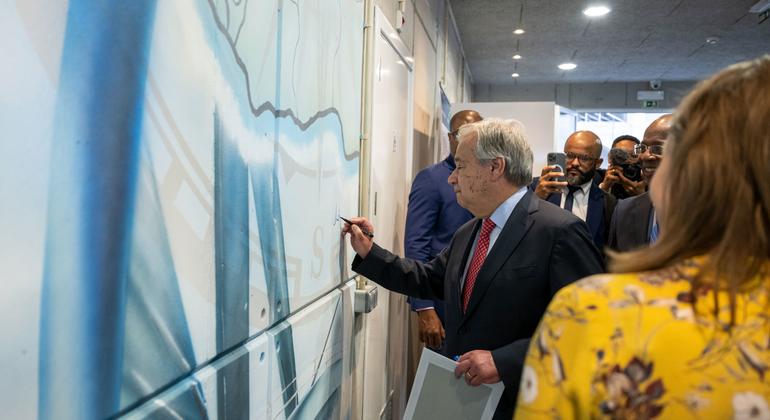Harbour Master
Harbour Masters
Worldwide there are approximately 3,000 merchant ports and the work of the Harbour Master can vary widely from country to country and from port to port even within the same country.



In mid-January there was a grand ocean yacht race (the Ocean Race: www.theoceanrace.com ) underway and by 25 January participants had departed Cabo Verde for Cape Town, thence they will cross the South Pacific to the east coast of South America and North America, back across the Atlantic to Europe with a finish in Genoa on 1 July. It is understood that participating yachts carry equipment to gather appropriate scientific data.
On the last day of his visit to Cabo Verde, UN Secretary-General António Guterres addressed the Ocean Race Summit Mindelo, saying that ‘Ending the ocean emergency is a race we must win. And by working as one, it is a race we can win. Let us all become the champions the ocean needs. Let us end the ocean emergency and preserve this precious blue gift for our children and grandchildren.’
The Secretary-General was speaking from the Ocean Science Centre Mindelo, in São Vicente, a leading facility that hosts large marine scientific equipment such as deep-sea robots, as well as electronics workshops, and laboratories.
Ulisses Correia e Silva, Prime Minster of the archipelago and island country, explained, ‘It represents tourism, desalinated water, blue economy, submarine fibre optic cables, clean energy, biotechnology, aquaculture, canning industry for export, a competence centre and nautical events ...”
Cabo Verde’s development projects supported by the UN are helping to transform the agricultural sector of Santo Antão, the westernmost island of Cabo Verde.
Speaking to UN News, the UN Special Adviser on Africa, Cristina Duarte, noted that as Cabo Verde is a ten-island chain that lies off West Africa’s Atlantic coast, some 99.3% of the nation’s territory is water. She is Cabo Verdean, was the country’s Minister of Finance, Planning and Public Administration from 2006 to 2016 and said: ‘We might be more creatures from the ocean than from the land. For Cabo Verde, the oceans are a matter of survival. So, its conservation [must be done] in a context of management of a natural resource, because we have to take from it what Cabo Verde needs to develop. Preserve it, but not forget that, for Cabo Verde, it is an economic resource.’
A key resource at risk
For the UN Secretary-General, the Summit was also an opportunity to sound the alarm with: ‘The ocean is life. The ocean is livelihoods. And the ocean is in trouble.’
The UN chief explained that some 35% of global fish stocks are over-exploited, global heating is pushing ocean temperatures to new heights, fuelling more frequent and intense storms, rising sea levels, and the salinisation of coastal lands and aquifers.
He continued: ‘Meanwhile, toxic chemicals and millions of tons of plastic waste are flooding into coastal ecosystems – killing or injuring fish, sea turtles, seabirds and marine mammals, making their way into the food chain and ultimately being consumed by us.’
Plastic pollution
Reference was made to the 2022 events: the historic agreement in Nairobi in to negotiate a globally binding treaty to control plastic pollution, the UN Ocean Conference in Lisbon, where countries made hundreds of new voluntary commitments and pledges, and the UN Biodiversity Conference in Montreal, that ended with countries agreeing on a target to protect 30% of land, water, coastal and marine ecosystems by 2030.
Guterres added: ‘Some have called 2022 the ocean’s ‘super year.’ But the race is far from over. We need to make 2023 a year of “super action,” so we can end the ocean emergency once and for all.
Urgent action four ways
For the UN chief, the world needs urgent action in four fundamental ways:
Turning to the finance sector, Mr. Guterres said that: ‘Developing countries are victims of a morally bankrupt global financial system, designed by rich countries to benefit rich countries.
‘Bias is baked into the system. It routinely denies developing countries – particularly vulnerable middle-income countries and Small Island Developing States like Cabo Verde – the concessional financing and debt relief they need.’
Picture caption
Secretary-General António Guterres signs the Ocean Race map with Ulisses Correia e Silva, Prime Minster of the archipelago and island country Cabo Verde.
UN Photo/Mark Garten. ©.
Cabo Verde lighthouse. UN Photo/Mark Garten. ©.
Founded in 2017, MarineLabs delivers high-resolution, real-time, and historical wind, wave, and weather data, as well as hyper-local 10-day forecasting, from a growing network of cloud-connected, rugged sensor nodes.
The International Harbour Masters Association (IHMA) and the Port of Rotterdam Authority are pleased to announce the 15th International Harbour Masters Association Congress, to be held from 09–12 June 2026 at Theater Zuidplein in Rotterdam.